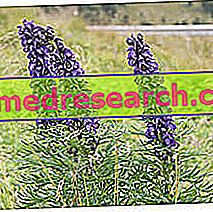
Scientific name
Aconitum napellus L.
Family
Ranunculaceae
Origin
Mountain areas of Europe.
Used Parts
The drug consists of the root, but also of the tubers that are formed in the spring.
Aconite in Herbalist: Property of the Aconite
In all its parts (tuber and herbaceous parts), the aconite contains polycyclic alkaloids toxic to the central nervous system, in particular aconitine, capable of causing dizziness, paresthesia, hypothermia, arrhythmias and breath disorders.
At one time the aconite was recommended against neuralgia and numerous other disorders, for which, however, its effectiveness was never demonstrated.
Biological activity
As mentioned, aconite is considered a toxic plant due to the alkaloids it contains. In particular, most of the activity is attributed to aconitine, although all the alkaloids contained in the plant are toxic.
When aconitine is taken in small doses it leads to the onset of bradycardia and hypotension; while if it is taken at high doses, it first exerts a positive inotropic effect and then leads to the onset of cardiac arrhythmias until it reaches cardiac arrest.
If used externally, on the other hand, the aconite has an anesthetic effect.
Finally, it seems that this plant is also endowed with febrifugal activity.
Aconite in folk medicine and in homeopathy
In folk medicine, aconite was used to treat neuralgia (in particular, trigeminal neuralgia and intercostal neuralgia), myalgia, rheumatic pain, migraine and skin inflammation, but not only. In fact, the plant was also used by traditional medicine as a remedy to combat disorders such as gout, arthritis, facial paralysis, inflammation, pleurisy, pericarditis, fever, skin diseases and as an external remedy to disinfect wounds.
Currently, the only approved use of the aconite is that which concerns its use within homeopathic medicine. In this context the aconite is used in the event of palpitations, anxiety, acute inflammatory diseases, gastralgia and abdominal pain.
The aconite homeopathic remedy is available in the form of granules and oral drops. The amount of product to be taken can vary greatly from one individual to another, also depending on the type of disorder that needs to be treated and according to the type of preparation and homeopathic dilution that you want to use.
Aconite - Warnings
Aconitine is a very toxic alkaloid (lethal dose in humans 3-6 mg, for which 3-4 g of fresh tuber are sufficient to kill a man), so dangerous that it renders the plant unusable in therapy (the aconite finds however applications in the homeopathic field). At the toxic dose, nausea and vomiting occur within minutes, followed by respiratory and cardiac paralysis.



